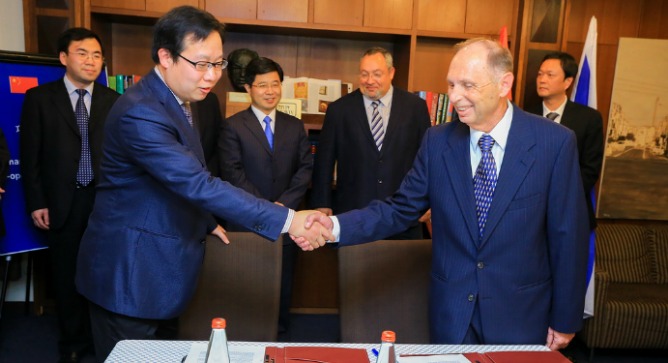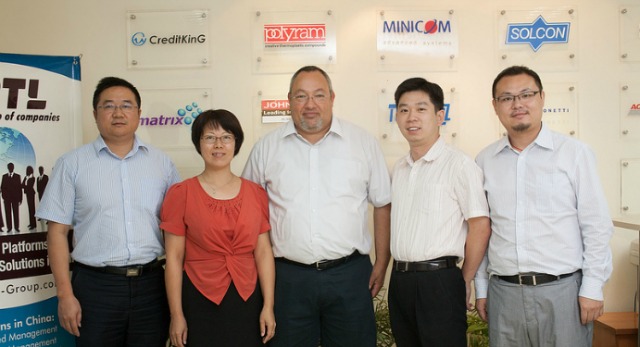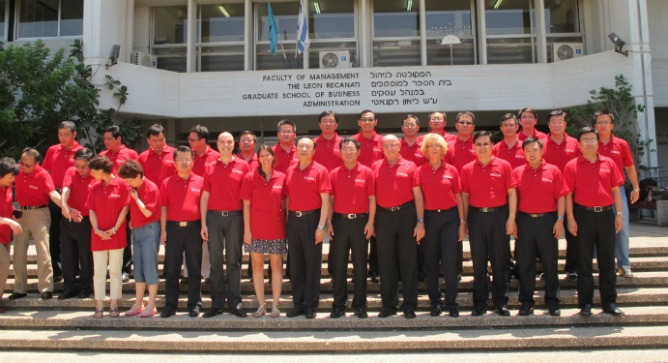The maker of a new app that automatically translates phone conversations is the latest Israeli business to plan a research center in China’s Changzhou City.
Lexifone founder Ike Sagie signed a memorandum of understanding earlier this year with Changzhou Vice Mayor Fang Guoqiang in Tel Aviv.
Guoqiang was leading a high-level economic delegation from Changzhou, which has actively been forging business ties with Israeli startups and established companies for the past two years in cooperation with the PTL Group, founded in 2000 to help Israeli companies with logistics, manpower and financial services in the vast Chinese market.
“We intend to continue and expand cooperation with Israeli technology companies, to establish a complete Chinese-Israeli Technology Park in Changzhou,” said Guoqiang.
The vice mayor quipped that the book Start-Up Nation ought to be revised to include a chapter describing the intense activity of Israeli companies in the “Dragon City.”
China and Israel, 12 hours apart by air, established diplomatic relations in 1992 and business ties have been growing exponentially over the past decade.
Chinese-Hebrew interaction
Lexifone’s software already works in Chinese (as well as English, German, French, Portuguese, Russian, Spanish and other common languages), but the founders are eager to fine-tune its fluency to better facilitate transnational calls for the increasing number of people doing business with China.
“The entire world is trying to get into this field, including IBM, Lucent and Microsoft, but it’s very demanding in terms of technology,” says Lexifone VP for business development Itay Sagie, Ike’s son.
“The high accuracy we have achieved is because of a technology called linguistic optimization, our core IP,” Sagie tells ISRAEL21c. Lexifone’s eight-strong Haifa workforce built a voice-to-voice translation engine and a worldwide telephony platform.
“We need to work with local linguists and computer scientists to customize the software for Chinese market needs and to find proper use cases in the country — whether call centers, receptionists or government offices. They will work closely with our Israeli team in Haifa.”
Sagie says the help of PTL is critical to the success of the venture in China.
“I took some lessons in Chinese language and culture, but I have not yet been there,” he says, noting that like Israelis, the Chinese move quickly to implement new ideas with a handshake and verbal understanding.
However, the conservative Chinese culture demands conformity to certain norms that are difficult for Israelis to grasp.
“Israelis lack the confidence to do business there, so we developed a support system to deal with those problems for them,” says Zvi Shalgo, CEO of PTL and chairman of the Israeli Chamber of Commerce in Shanghai.
“When a company has the vision to enter China, we help them get a foot in the market, helping them get local teams for production and local investment in their business.”
PTL has helped set up many manufacturing partnerships between Israel and China, and now is adding R&D centers in Changzhou to the mix. The Changzhou government is investing heavily in this initiative, Shalgo tells ISRAEL21c.
Recruiting Chinese talent
The first Israeli company that is establishing an R&D center in Changzhou is software developer Matrix Global, which has already recruited its first batch of Chinese engineers for a six-month retraining session run by Israel-based John Bryce Training.
“We intend to do that for many more companies,” says Shalgo, who organized a “Go China” high-tech conference at Tel Aviv University for the Chinese VIPs in cooperation with the MIT Entrepreneurship Forum.
“We also set up a joint VC investment fund to invest in Israeli companies,” he continues. “We’ve signed agreements with the first two companies. They can use the money as they want, but of course we prefer to help companies intending to operate in China. We can help them come to the market and not wait till they can do it by themselves.”
Under PTL’s Changzhou Industrial Incubation Initiative (CI3), two Israeli companies in the medical devices field have already begun manufacturing. Through another of PTL’s programs, Israeli nutritional supplement company LycoRed built a turnkey factory in Changzhou three years ago.
Chinese officials visit Israel four or five times a year to encourage continued cooperative ventures.
“There is a lot of activity,” says Shalgo. “The local government announced [Changzhou] as an Israeli-China development area. It looks promising.”
















